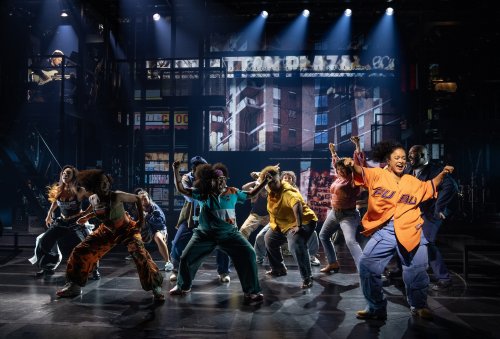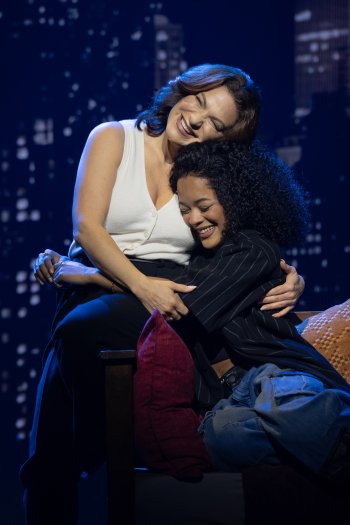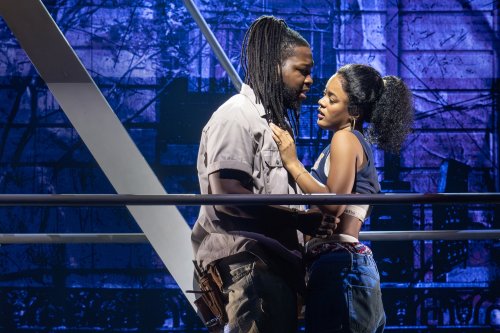Hell’s Kitchen
Big ambitious, coming-of-age story using the Alicia Keys catalog is an exciting muscial but in need of character development.

Maleah Joi Moon (foreground) and the company of the world premiere of Alicia Keys’ “Hell’s Kitchen” at The Public Theater (Photo credit: Joan Marcus)
[avatar user=”Victor Gluck” size=”96″ align=”left”] Victor Gluck, Editor-in-Chief[/avatar]
Hell’s Kitchen, a juke-box musical with a score by singer/songwriter Alicia Keys and a book by playwright Kristoffer Diaz (The Elaborate Entrance of Chad Deity), is a big ambitious show, a love letter to New York, and inspired by the coming-of-age story of Keys’ 17th year. It is also over-miked, with undeveloped characters and a plot that is all over the place. It is a crowd pleaser with the iconic Keys’ songs “Girl on Fire,” “Fallin’” and “Empire State of Mind.” Excitingly performed by its cast made up of a handful of characters and a large ensemble of 15 singer/dancers, its most famous leads Shoshana Bean and Brandon Victor Dixon as Ali’s parents are given little to do as this is the daughter’s story. In the leading role of 17-year-old Ali, making their professional debut, is Maleah Joi Moon who proves to be an exciting musical personality who can hold a show such as this together.
The musical follows several unrelated plot lines. Ali narrates her story often talking directly to the audience, but not consistently. Living in a cramped one-bedroom apartment in Hell’s Kitchen’s Manhattan Plaza, she is often at odds with her mother Jersey (short for the nickname Jersey Girl) who thinks the neighborhood is too dangerous for a teenage girl and she is too young to be running around much alone. She is also very wayward about keeping up with her high school homework. When Ali falls in love with a street drummer Knuck who is older, her mother immediately takes against him as he reminds her too much of her irresponsible musician ex-husband, who left when Ali was two, and has Ray, the doorman, inform her of their meetings.

Brandon Victor Dixon and Shoshana Bean in a scene from the world premiere of Alicia Keys’ “Hell’s Kitchen” at The Public Theater (Photo credit: Joan Marcus)
Jersey calls Ali’s absent father Davis, an itinerant jazz piano player, to come and help with her problem. Ali wanders into the building’s Ellington Room attracted by the music and encounters a professional pianist Miss Liza Jane who inspires her to learn how to play the piano. When they bond, Jersey becomes jealous of the time her daughter is spending with a stranger. Things come to a crisis when Jersey finds Ali sleeping with Knuck in their apartment on a day when Ali thinks her mother is at work. The show ends pretty much where it started but with Ali now with a mission to follow music.
Michael Greif who has been associated with some of the most acclaimed musicals in recent years (Dear Evan Hansen, Next to Norman, Grey Gardens and Rent) directs with a sure hand though the thin characterizations are a product of the writing and not the staging. The choreography by the very busy Camille A. Brown is dynamic and exciting. Moon is a force of nature as Ali in all categories, singing, dancing, acting, and should have a very bright future. Bean and Dixon are fine in unwritten, one dimensional roles as her estranged parents, but manage to flesh them out themselves. Best is Kecia Lewis as pianist Miss Lisa Jane who brings a quiet dignity and a stately elegance to her role as a mentor figure to Ali.

Shoshana Bean and Maleah Joi Moon in a scene from the world premiere of Alicia Keys’ “Hell’s Kitchen” at The Public Theater (Photo credit: Joan Marcus)
In the thankless role of Knuck, Chris Lee spends most of his time apologizing for not being the thug that Jersey assumes that he is, but has an impressive presence nevertheless. As Jersey’s two performer friends in the building Crystal Monee Hall and Mariand Torres, and Ali’s school aged friends Vanessa Ferguson and Jackie Leon, these actresses are good as far as the material allows them considering it tells us little about who they are. As the rest of Knuck’s trio, Jakeim Hart and Lamont Walker II are excellent musicians and establish their street cred in the few brief scenes in which we see them.
Diaz’s book does not address many vague, unanswered questions. Where does Ali go to school? What two jobs does Jersey work at? How little has Davis been in Ali’s life? How old is Knuck? Manhattan Plaza at 44 stories of artists, musicians and performers does not sound like the dangerous place Jersey describes to Ali as Hell’s Kitchen. The minor characters remain undeveloped and we know almost nothing about them: Jersey’s two best friends in the building Crystal and Millie, or Ali’s friends Tiny and Jessica. We also are not told how far Jersey got in her career as an actress which allows them to live in Manhattan Plaza, a rent stabilized building.

Maleah Joi Moon and Kecia Lewis in a scene from the world premiere of Alicia Keys’ “Hell’s Kitchen” at The Public Theater (Photo credit: Joan Marcus)
The score of 23 musical numbers is sabotaged by the sound design by Gareth Owen and/or the orchestrations by Adam Blackstone and Tom Kitt which drowns out a good many song lyrics. This is fatal in a book musical, rather than a revue or variety show, which is also affected here by repetitious lyrics from pop songs not originally intended for a musical. Although the score is mostly from the Alicia Keys catalog, there are three new songs written for the show (“The River” sung by Ali, “Seventeen” sung by Jersey and friends, and “Kaleidoscope” sung by Ali and friends) which seem less effective than the others though they are intended to flesh out Ali’s character. The three most famous songs (“Girl on Fire” sung by Ali and Jersey’s friends in the building, “Fallin’” sung by Davis and Jersey and “Empire State of Mind” used as the finale) are all treated like anthems which may be the orchestrations rather than the dramatic intent. The most powerful numbers are Miss Liza Jane’s two quietly sung “Perfect Way to Die” and “Authors of Forever” with their muted, unobtrusive accompaniment.
The design elements by its high powered professional team are often at odds with the show. Robert Brill’s setting relies on ugly intrusive scaffolding while Peter Nigrini’s overly busy projection design offers little atmosphere for its Manhattan perspective. (Was Gramercy Park ever that grim?) The often dark lighting by Natasha Katz makes it clear this is a dark time in New York City’s history even during the street sequences. The costumes by Dede Ayite are bland to the point of being invisible, though in truth these are people who either can’t afford expensive clothing or who are not interested in how they look.

Chris Lee and Maleah Joi Moon in a scene from the world premiere of Alicia Keys’ “Hell’s Kitchen” at The Public Theater (Photo credit: Joan Marcus)
Hell’s Kitchen is both ambitious and noble in its intentions. However, as of now the show on the stage of The Newman at The Public Theater is not there yet. With very few characters developed and too many unanswered questions, the show’s book needs a simple rewrite. The Alicia Keys’ score which too often sounds the same could use a reshaping to find some climactic moments other than the drama in the story. The plot lines need to come together more, rather than as disparate elements that take us in new directions all the time. Ultimately, Hell’s Kitchen has great potential when these problems are addressed.
Hell’s Kitchen (extended through January 14, 2024)
The Public Theater
Newman Theater, 425 Lafayette Street, in Manhattan
For tickets, call 212-967-7555 or visit http://www.publictheater.org
Running time: two hours and 40 minutes including one intermission






Leave a comment